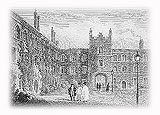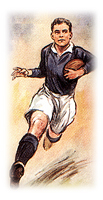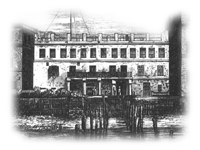
"Blues, Natives, Hawks and Rhadegunds"
Going up to Cambridge on a scholarship from Bedford Modern School, my father had four glorious years at Jesus College. His full name was Cyril Herbert Williams but a friend at University had, mericifully, dubbed him Bluff King Hal, of which the 'Hal' stuck. Later, in Kenya, he was known as 'Ngombe' (bull) and sometimes 'C.H.' He stood six foot four and built to match with ears that stuck out cheerfully and small eyes that twinkled. When he smiled his mouth stretched quite straight across his face, which endowed it with an endearing innocence "He had a charming manner and easy temperament which made him beloved by all who knew him." and along with almost every other undergraduate at the time, he had the time of his life at University. Cambridge does not seem to have been such a pressure cooker of learning that it is today. Competition for places was less intense because many undergraduates paid their own fees. Pat O'Dwyer, who later went to Sierra Leone wrote: "It is time I said something about work for that is really what one went up to Cambridge for. I really did not know what I should read when I first went up but I had made my mind up to go into the Colonial Service if I could. I had decided this when I was at Cheltenham and the Rev F.W. Gillingham came to preach in chapel. He had played county cricket for Essex and was a famous preacher. He spoke about the British Empire and that there was no greater service one could perform in life than to serve the cause of that empire as your life's work. After the war he was Vicar of St Michaels, Chester Square and I remember going there to a service with Aunt Do and he preached on the International Rugger match, England v Scotland which had taken place the day before at Twickenham and at which he had been a steward. I had just got back from West Africa, blind, and I told him how he had inspired me in my youth. My tutor was Gus Elliot and he advised me to read history. He himself was a history Don and a quite splendid person. His names were Claude Augustus, an Old Etonian himself and the year I went down, 1933, he went on to be Headmaster of Eton where he remained throughout the war. Finally, he became provost of Eton and got a knighthood. We used to play squash together and afterwards he always asked me back to his house. I enjoyed reading history but I really did not work hard enough, so much being taken up with games etc... The most distinguished history lecturer we had was George Trevelyan, who later became Master of Trinity and was knighted. He wrote some marvellous books, of course, but in truth he was not a very inspiring lecturer. However, he was obviously a very nice chap and he offered all in his class to call on him at his house in Grange Road, to have tea with him and discuss any historical questions. What a fool I was never to take up this kind offer, always preferring to be off playing some game." The post-graduate cadet course was the best year of all. These cadets "were a sporting lot, happy and secure with their degrees and acceptance into the Colonial Service." My father was awarded a rugby blue during this post-graduate year in 1930. The huge importance of such a glory is manifested in two letters from T. Coates, who was probably a master at Bedford Modern School. It seems that in the previous year my father had been in the running for a blue but had not been selected.
However, the following year Mr Coates' wrote with touching delight:
Another old Bedford Modern who had gone up to Oxford was equally generous:
But my father's glory was shortlived.
In those days during a penalty kick the ball was held up by another player. As soon as it was put on to the ground the opposing side were permitted to charge the ball. However, Oxford charged before the ball was put down and my father held back, waiting for the referee's whistle. Unfortunately, the whistle was never blown and, too late, my father scrambled to kick but the ball never left the ground, thus losing the match for Cambridge.(4) But rugby was not the only game the cadets played of course. They "formed a squash Rackets club (no premises, just played a few matches) and Ngombe, in spite of his unlikely figure even in those days, was a member of it." An extract from 'The Times' records that in a match against Christ's, where he played third string out of five for the Colonial Practitioners Club, he lost in three straight games 2 - 9, 3 - 9, 6 - 9 to D. F. Kerr "Who wasn't very good! But the thing is that he [my father] played. He entered into everything and was a great-hearted, jolly fellow like so many of his build." Joining clubs was an important part of university life and my father's great friend, Pat O'Dwyer, also a Jesus man, was a member of the Wheatsheafs, the Hawks, the Rhadegunds and the Natives. The Natives, to which my father belonged, was purely a social club where only kindred spirits were elected. An earlier Jesus man, Ewart Grogan who became famous in Africa for his trek from Cape to Cairo, is still toasted by the Natives; "Grogan!" although present day students have no idea why. The senior club in the College was the Rhadegunds. Saint Rhadegund was the patron saint of the college. She was a sixth century lady, the wife of a brutal Thuringian King. As she fled from his tyranny, a half-grown field of oats sprang up around her and hid her. As proper sainted ladies of the sixth century often did, she founded a convent in gratitude. Later, rum goings on between the convent and a nearby monastery by way of a tunnel, forced the disbandment of the convent and there followed the establishment of a seminary for learning, namely Jesus College. To be a member of the Rhadegunds, one had to have a double College colour. Initiation into the club was to drink port from a half-pint silver bumper. Pat O'Dwyer, who had a university boxing blue and captained Jesus rugger, drank four bumpers. The Colonial Service Probationers attended lectures on surveying, agriculture and native languages. They built bridges across the Cam with petrol tins which usually culminated in "an adjournment to the nearest pub for necessary discussion. So great was my ignorance of Kenya." wrote my father "that it never occurred to me to ask if petrol tins would always be available." They were taught the languages used in their destined colonies and they studied anthropology, a subject which Pat O'Dwyer found "utterly useless". Henry Barnes, who "used very bad language" and had been President of Mexico for a week taught them law. Health lectures were given by an officer of the Colonial Medical Service who, "from his looks, had suffered from every disease on which he was lecturing." He advised them "not to drink alcohol before sundown and to eschew cocktails in any shape or form as they changed the stomach from a membranous bag into a museum exhibit. (Williams)
|
Back to Table of Contents | Back to Articles | Chapter 3
Armed Forces | Art and Culture | Articles | Biographies | Colonies | Discussion | Glossary | Home | Library | Links | Map Room | Sources and Media | Science and Technology | Search | Student Zone | Timelines | TV & Film | Wargames



